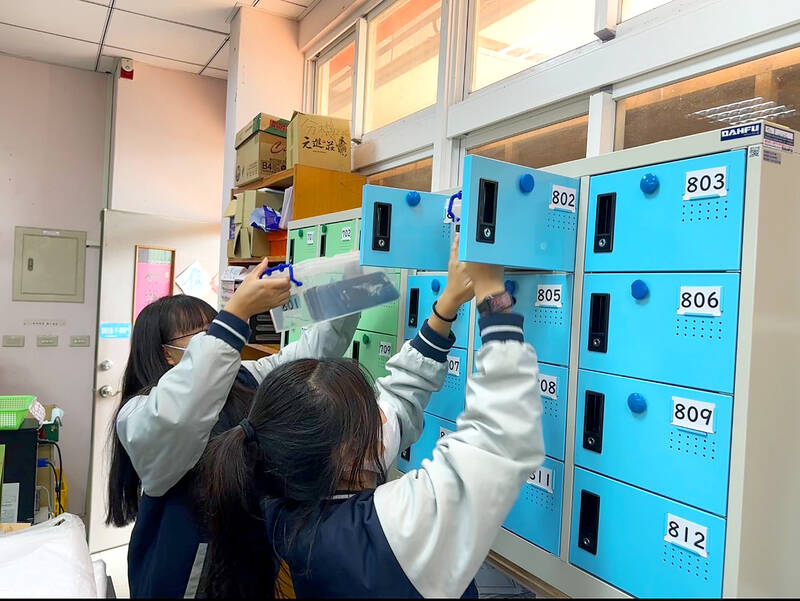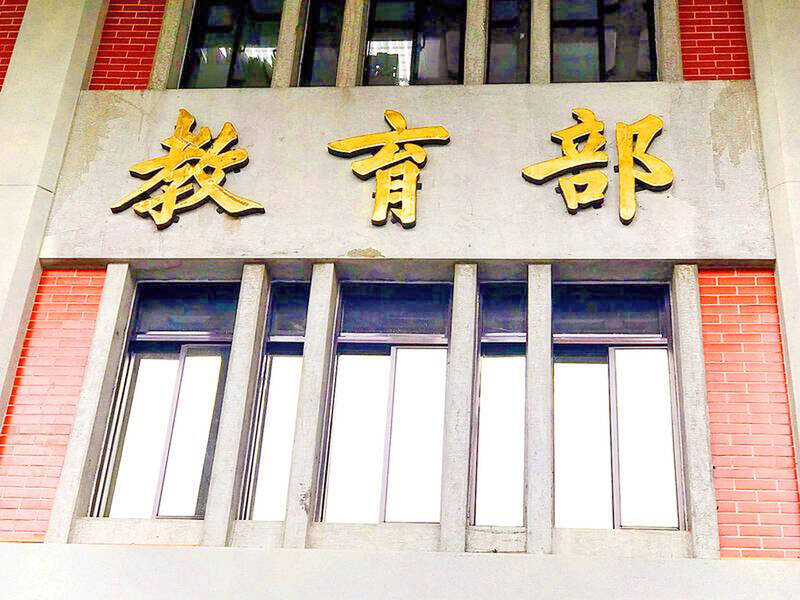The Ministry of Education yesterday said it plans to propose a regulation banning students’ use of mobile phones on campus except for learning or emergencies.
The legislature in October last year held a public hearing, in which mandatory regulations on smartphone use at schools were suggested, as teachers had difficulties managing students.
To deal with smartphone addiction among students, the ministry has convened an interagency meeting to discuss amendments to its Guidelines on the Use of Mobile Devices on Campus at Senior-High School Level or Below (高級中等以下學校校園行動載具使用原則), expecting to complete the draft before the spring semester.

Photo: Hung Mei-hsiu, Taipei Times
The ministry’s Department of Information and Technology Education official Tsai Wan-lin (蔡宛霖) said that guidelines promulgated in 2019 stipulate that mobile devices must be turned off at school except for learning under the teacher’s guidance or emergencies, and students should be prevented from engaging in activities irrelevant to learning with such devices.
As representatives at the interagency meeting suggested stricter management of mobile devices on campus, the ministry would continue to consult expert opinions and other countries’ policies to revise the guidelines, Deputy Minister of Education Chang Liao Wan-chien (張廖萬堅) said.
A possible solution is to allow confiscation and custody of students’ smartphones by schools, he added.

Photo: Rachel Lin, Taipei Times
Representatives of different groups would be invited to discuss them once the amendments are drafted, it said.
Democratic Progressive Party Legislator Fan Yun (范雲) cited a survey by the Ministry of Digital Affairs as saying that the severity of smartphone addiction among junior and senior-high school students is second only to that of college students.
As smartphone addiction can negatively affect learning, many countries, including the US and the UK, have promulgated regulations on students’ smartphone use, she said.
The Los Angeles Times has reported that California passed the Phone-Free Schools Act requiring high schools within the state to develop policies limiting or banning smartphone use during school hours by next year, with classroom lockers or magnetic pouches used to lock in students’ smartphones.
Meanwhile, EdYouth cofounder Lee Ruei-lin (李瑞霖) said today’s generation of students are digital natives born to live with smartphones, and they would find it intolerable to be banned from using the devices at school.
Lee cited a senior-high school student as saying that he would bring two phones to school, allowing the school to confiscate one phone while keeping another with himself.
Confiscation of smartphones is not an effective solution to digital addiction, he said, adding that the key lies in understanding students’ learning needs, enhancing the sense of meaning and guiding them to leverage digital tools in their learning journey.
A survey conducted by a student group suggested that most parents and teachers are supportive of restricting on-campus smartphone use, while half of junior-high school students and up to 90 percent of senior-high school students said they disagreed with the policy.
National Federation of Teachers’ Unions chairman Hou Chun-liang (侯俊良) said most teachers would support the ministry’s revision to the guidelines, as it would bolster students’ learning and class management.
However, feasible supplementary measures should also be established to address some students’ or parents’ special needs, and handle contravention of the rules, he said.
Smartphone addiction should be handled by employing counseling resources rather than mandatory rules, Hou added.

CHAOS: Iranians took to the streets playing celebratory music after reports of Khamenei’s death on Saturday, while mourners also gathered in Tehran yesterday Iranian Supreme Leader Ayatollah Ali Khamenei was killed in a major attack on Iran launched by Israel and the US, throwing the future of the Islamic republic into doubt and raising the risk of regional instability. Iranian state television and the state-run IRNA news agency announced the 86-year-old’s death early yesterday. US President Donald Trump said it gave Iranians their “greatest chance” to “take back” their country. The announcements came after a joint US and Israeli aerial bombardment that targeted Iranian military and governmental sites. Trump said the “heavy and pinpoint bombing” would continue through the week or as long

TRUST: The KMT said it respected the US’ timing and considerations, and hoped it would continue to honor its commitments to helping Taiwan bolster its defenses and deterrence US President Donald Trump is delaying a multibillion-dollar arms sale to Taiwan to ensure his visit to Beijing is successful, a New York Times report said. The weapons sales package has stalled in the US Department of State, the report said, citing US officials it did not identify. The White House has told agencies not to push forward ahead of Trump’s meeting with Chinese President Xi Jinping (習近平), it said. The two last month held a phone call to discuss trade and geopolitical flashpoints ahead of the summit. Xi raised the Taiwan issue and urged the US to handle arms sales to

BIG SPENDERS: Foreign investors bought the most Taiwan equities since 2005, signaling confidence that an AI boom would continue to benefit chipmakers Taiwan Semiconductor Manufacturing Co’s (TSMC, 台積電) market capitalization swelled to US$2 trillion for the first time following a 4.25 percent rally in its American depositary receipts (ADR) overnight, putting the world’s biggest contract chipmaker sixth on the list of the world’s biggest companies by market capitalization, just behind Amazon.com Inc. The site CompaniesMarketcap.com ranked TSMC ahead of Saudi Aramco and Meta Platforms Inc. The Taiwanese company’s ADRs on Tuesday surged to US$385.75 on the New York Stock Exchange, as strong demand for artificial intelligence (AI) applications led to chip supply constraints and boost revenue growth to record-breaking levels. Each TSMC ADR represents

State-run CPC Corp, Taiwan (CPC, 台灣中油) yesterday said that it had confirmed on Saturday night with its liquefied natural gas (LNG) and crude oil suppliers that shipments are proceeding as scheduled and that domestic supplies remain unaffected. The CPC yesterday announced the gasoline and diesel prices will rise by NT$0.2 and NT$0.4 per liter, respectively, starting Monday, citing Middle East tensions and blizzards in the eastern United States. CPC also iterated it has been reducing the proportion of crude oil imports from the Middle East and diversifying its supply sources in the past few years in response to geopolitical risks, expanding